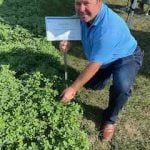They’re back.
With one fell swoop, MPs descended on Parliament Hill Monday morning with energy and gusto, their smiles as crisp as the chilly Ottawa fall air that greeted them.
Fall has officially arrived.
There is much anticipation about what might come about during this new fall sitting. For political journalists, the return of Parliament marks the end of the dog days of summer and a return to the rapid fire pace that is federal politics.
As one of my colleagues said Sept. 15, “thank goodness they’re back,” a sentiment shared, at least temporarily, among Hill scribes.
Read Also

Worrisome drop in grain prices
Prices had been softening for most of the previous month, but heading into the Labour Day long weekend, the price drops were startling.
Depending on the amount of partisan bickering and slandering though, we might all be wishing them a safe return flight home to their ridings come the start of next week.
However, this fall’s return of Parliament is different from previous sessions. This time the House is coming back in pre-election mode. Campaigning has already begun.
With a fixed election date of Oct. 19, 2015, all political parties will be pushing to distinguish themselves from the competition.
The NDP, for their part, have come charging out of the gate. The party has already announced a series of policy promises and commitments they will roll out if they win in 2015, including the return of a federal minimum wage.
With the Liberals still surging in the polls, the policy move is clearly a way to distinguish the NDP from their Grit counterparts, who have been widely criticized for their lack of policy.
The Liberals, meanwhile, will need to spend the next year capitalizing on their rise in the polls and public spotlight. While Trudeau has appeared almost untouchable in the past, he is guaranteed to continue as the Conservatives’ No. 1 political target.
As for the Conservatives, Parliament’s return is a chance to wrap up unfinished business before the writ is dropped and politicians hit the official campaign trail.
On the agriculture front, MPs will likely need a refresher in the Agricultural Growth Act (Bill C-18), which would see Canada sign onto UPOV 91. The bill was referred to the House agriculture committee in June with meetings set to start later this month.
As for the Senate agriculture committee, those members wasted no time jumping back into their bee health study, with witnesses called to testify from the auditor general’s office. Hearings are scheduled to continue throughout the fall, with a final report expected in December.
All eyes will continue to scrutinize the rail system and the government’s temporary fix via the Fair Rail for Grain Farmers Act as the fall harvest continues.
The federal government, under the direction of agriculture minister Gerry Ritz and transport minister Lisa Raitt, will also have to re-examine the current mandatory movement minimums for both national railways and decide whether to extend them by the end of November.
Meanwhile, Transport Canada will continue to work on its rail service review. Sources said hearings for that review could start as early as November and likely carry over into December. The department must deliver a final report next year.
As for trade, the government has yet to ratify the South Korea trade agreement, which was finalized last March. The agreement was tabled in the House in June. It’s likely the deal will be signed when South Korean president Park Geun-hye makes her first state visit to Ottawa Sept. 20-22.
On the Trans Pacific Partnership front, few are expecting much progress to be made on the file until after the U.S. mid-term elections, a concern recently voiced by New Zealand president John Key.
Back in Ottawa, mitigating political damage from the ongoing Senate scandal is also likely to be a top Conservative priority as several court cases, including that of Mike Duffy, move forward in Ottawa.
It’s also likely we will see political posturing on the individual level as MPs work to position themselves for re-election. Whether that means a backbencher revolt or MPs speaking out against their parties, only time will tell. There are also several MPs who have decided to end their political careers, including long-time House agriculture committee member LaVar Payne.
With slightly more than a year left in their political lives, the new sitting for these members means time to work on that last legacy project. As for the sitting itself, it too will likely end up in the political history books, if only for being the first time the House has returned with a fixed election date in sight. Most though, expect it to be known for more than just that — the stakes and the political consequences are simply too high.
Buckle up. It’s going to be quite the ride.














